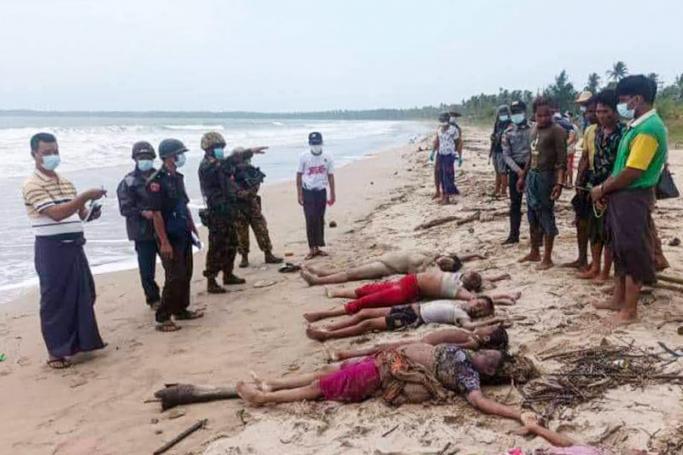The European Parliament on Thursday declared the 1930s starvation of millions of people in Ukraine under Soviet leader Joseph Stalin a "genocide", claims denied by Moscow.
Genocide is defined as "acts committed with intent to destroy, in whole or in part, a national, ethnical, racial or religious group".
The term was coined during the Nuremburg trials of Nazi war criminals to describe the Nazi extermination of six million Jews.
Here is a summary of the other mass killings considered by international bodies, courts, states or parliaments to constitute genocide:
- Namibia, 1904-1908 -
German settlers killed tens of thousands of indigenous Herero and Nama people who rebelled against colonial rule in the southwest African country of Namibia between 1904 and 1908.
In 2021, Germany acknowledged it had committed the first genocide of the 20th century and agreed to pay 1.1 billion euros in development aid to Namibia in lieu of reparations.
- Armenia, 1915-1917 -
Armenia says Ottoman Turk forces massacred and deported more than 1.5 million Armenians in the Ottoman Empire between 1915 and 1917, during World War I.
Around 30 countries have recognised the killings as genocide, a charge vehemently rejected by Turkey, which admits nonetheless that up to 500,000 Armenians were killed in fighting, massacres or by starvation during mass deportations from eastern Anatolia.
- Ukraine, 1932-1933 -
The European Parliament on December 15 declared the starvation of millions of Ukrainians under Soviet leader Joseph Stalin in 1932-1933 as a "genocide" -- a term also adopted by German lawmakers in November.
Kyiv believes the man-made "Holodomor" (Ukrainian for death by starvation) was engineered by Stalin to try to wipe out Ukrainians. Russia denies that.
- Cambodia, 1975-1979 -
Some two million Cambodians died from starvation, mass executions and overwork during the four-year reign of terror by the Maoist Khmer Rouge regime from 1975 to 1979.
In 2018, a UN-sponsored tribunal in Cambodia convicted the two top surviving leaders of the regime, Nuon Chea and Khieu Samphan, of genocide.
- Rwanda, 1994 -
At least 800,000 people, nearly all members of the Tutsi ethnic minority, were slaughtered by extremists from the ethnic Hutu majority in a 100-day killing frenzy in the east African country of Rwanda between April and July 1994.
The International Criminal Tribunal for Rwanda, based in the Tanzanian city of Arusha, issued the world's first genocide conviction in 1998.
- Srebrenica, 1995 -
The 1995 massacre in Srebrenica, eastern Bosnia, of more than 8,000 Muslim men and boys by Bosnian Serb forces was recognised as a genocide by the International Court of Justice, the UN's top legal body, in 2007.
Former Bosnian Serb leader Radovan Karadzic and military chief Ratko Mladic were convicted of genocide by a special UN court.
- Sudan, from 2003 -
Sudan's ex-president Omar al-Bashir is wanted by the International Criminal Court for genocide over the fighting that erupted in the western Darfur region in 2003 between ethnic minority rebels and Bashir's Arab-dominated government.
The UN estimates that 300,000 people died after Khartoum unleashed "janjaweed" Arab militia against the rebels in a scorched-earth campaign of murder, rape, looting and burning of villages.
- Yazidis, 2014 -
Islamic State jihadists in August 2014 massacred over 1,200 Yazidis, members of a Kurdish-speaking community in northwest Iraq that follows an ancient religion rooted in Zoroastrianism and whom IS viewed as "devil worshippers".
Thousands of Yazidi girls and women were abducted and kept as sex slaves.
In 2021, a German court convicted an Iraqi jihadist of "genocide" over the violence.
- Rohingya, from 2017 -
The International Court of Justice (ICJ) has accused the military junta in the predominantly Buddhist nation of Myanmar of "genocide" over its crackdown on the mostly Muslim Rohingya community in the past five years.
Around 750,000 members of Myanmar's mostly Muslim Rohingya community have fled to neighbouring Bangladesh amid reports of rape, murder and arson.
- Uyghurs, from 2017 -
Lawmakers in several Western countries have accused China of a "genocide" of the mostly Muslim Uyghur minority in western Xinjiang province, where at least one million people have been incarcerated in camps since 2017, according to rights groups.
A UN report in September 2022 said the abuses could constitute "crimes against humanity", which China denies, but avoided the term genocide.
AFP












